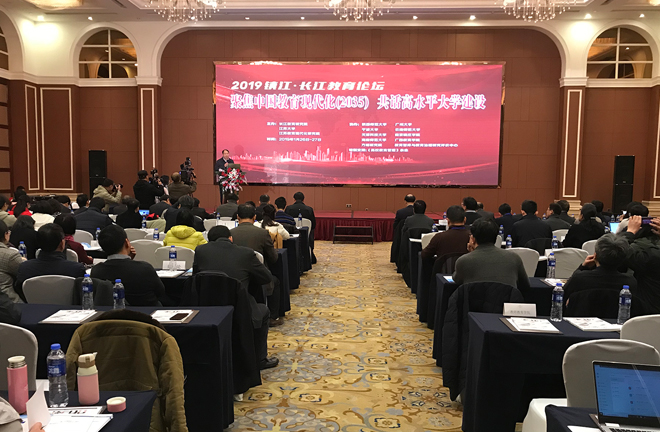Developing higher education

Scholars make suggestions for building China’s higher education power. Photo: CSSN
ZHENJIANG—The 2019 Zhenjiang·Yangtze River Education Forum was recently held in Zhenjiang, Jiangsu Province with the theme “China’s educational modernization (2035) and high-level university construction.” Scholars carried out in-depth discussions and made suggestions for building China’s higher education power.
China’s economy has shifted from high-speed growth to high-quality development with innovation as the driving force. Higher education plays an essential role in innovative development. Yan Xiaohong, president of Jiangsu University, said that high-level university construction is an important strategic move for China to transform from a big higher education country to a high-power one. High-level university construction is also of great significance for developing China’s education system, strengthening its core competitiveness and laying a foundation for its long-term development.
Sui Yifan, director of the Institute of Higher Education at Zhejiang University, said that the Double First-Class University Plan and the comprehensive development of higher education are the two wings of the development of higher education in the new era. The Double First-Class University Plan is mainly aimed at research universities. It aims to narrow the gap between the world’s higher education powers through creative talent cultivation and innovative knowledge production. However, the comprehensive development of higher education covers all the colleges and universities in China with the aim of improving higher education quality, especially the quality of personnel training, in an all-round way.
Hu Jinbo, secretary of the Party Committee of Nanjing University, said that in terms of the Double First-Class University Plan, we should take advantage of Chinese roots and run universities with Chinese characteristics. At the same time, we must emulate other world-class universities. This means that we should improve the quality of personnel training and scientific research, build world-class institutions and disciplines, and produce major original results.
To achieve the comprehensive development of higher education, it is necessary to modernize the university governance system. Sui said that higher education should shift from the traditional management model to a modern governance system, and it should take the high-quality, high-level and high-efficiency development of talent cultivation and innovative knowledge production as the goal.
Yan Guangcai, a professor from the Institute of Higher Education at East China Normal University, said that colleges and universities should be an academic community in pursuit of knowledge and pragmatism. Only in this way can they truly respond to the needs of China’s development.
Zhou Hongyu, president of the Changjiang Educational Research Institute, said that perfecting the rule of law in education is the basic guarantee for realizing education modernization. We should keep pace with the times, incorporate new requirements for education development into relevant laws and regulations, improve the quality standards and evaluation systems for higher education, and improve the modern university system.
(edited by SU XUAN)
